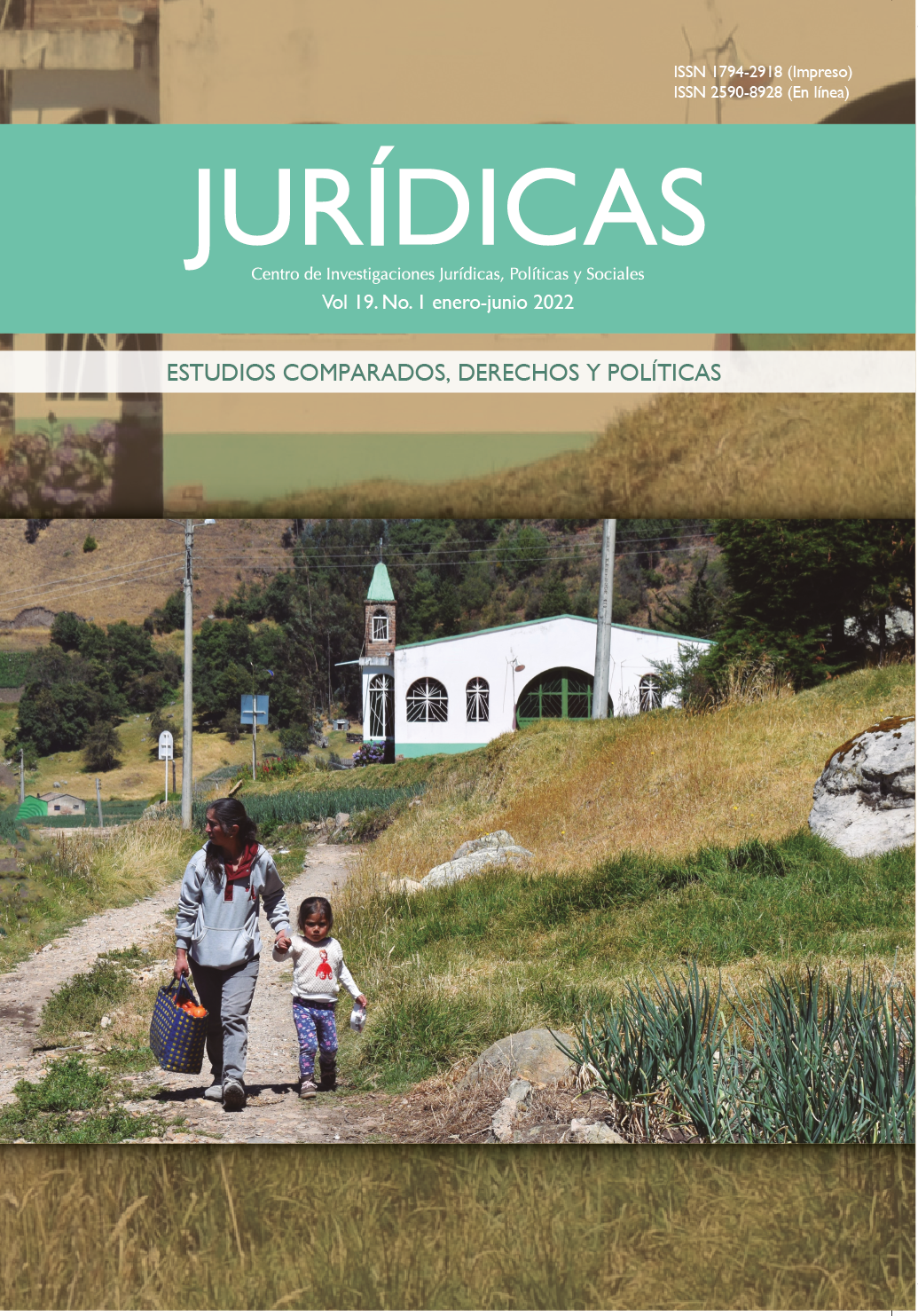Authors
Abstract
Based on the example of the role of orality in the foundation of moral and legal duty in the Kamëntšá and Inga native peoples settled in southwestern Colombia, this article proposes as its main objective to show that the indigenous oral narrative works as a distinctive way of argumentation that gives an objective foundation to the moral and legal duties of a community. Using the historical-hermeneutic method with a documentary analysis approach, two significant results are shown. The first is that an adequate conceptualization of the characterization of the indigenous oral narrative both from the
perspective of Western philosophy and from an indigenous point of view leads to the thesis that the foundation of moral and legal duties in the kamëntšá and inga communities has an eminently dialogical character. An additional result of the interpretive analysis is that the indigenous oral narrative is a form of argumentation that does not imply blind atavistic obedience. Finally, it concludes by indicating that the foundation of the moral and legal duties of the kamëntšá and Inga communities is formally similar to the foundation used by the most representative legal traditions of the West, but materially dissimilar both due to its community emphasis and its marked objective character of the moral values.
References
Atienza-Rodríguez, M. (2013). Curso de argumentación jurídica. Trotta.
Atienza, M. (2017). Filosofía del derecho y transformación social. Trotta.
Ávila-Santamaría, R. (2019). La utopía del oprimido: los derechos de la Pachamama (naturaleza) y el Sumak Kawsay (buen vivir) en el pensamiento crítico, el derecho y la literatura. Ediciones Akal.
Bonilla, V. D. (1969). Siervos de dios y amos de indios: el Estado y la misión capuchina en el Putumayo. Stella.
Camargo-Solano, Á. (2018). El Reto Constitucional frente a la Omisión Legislativa en la Creación de la Jurisidicción Especial Indígena en Colombia y la Protección de la Oralidad. En L. A. Cucarella- Galiana (ed.), Proceso Constitucional y Derechos Humanos (Oralidad y Eficiencia de la Justicia) (pp. 105-123). Ediciones Nueva Jurídica.
Campbell, J. (1991). The Power of Myth. Random House.
Cassirer, E. (1955). The Philosophy of Symbolic Forms (Vol. 2). Yale University Press.
Cassirer, E. (1967). An Essay on Man. Yale University Press.
Cassirer, E. (1996). The Philosophy of the Symbolic Forms (Vol. 4). Yale University Press.
Castro-Gómez, S. (2010). la hybris del punto cero. Pontificia Universidad Javeriana.
Davis, W. (2015). Los guardianes de la sabiduría ancestral: su importancia en el mundo moderno. Sílaba.
De Castellví, M. (1944). Historia Eclesiástica de la Amazonía Colombiana. Revista Universidad Pontificia Bolivariana, 483-596.
De Humboldt, A. (2012). Vistas de las Cordilleras y monumentos de los pueblos indígenas de América. Universidad Autónoma de Madrid.
De Sousa-Santos, B. (2014). Derechos humanos, democracia y desarrollo. Centro de Estudios de Derecho, Justicia y Sociedad, Dejusticia.
Eliade, M. (1954). Myth of the Eternal Return. Princeton University Press.
Eliade, M. (1963). Myth and Reality. Harper & Row, Publishers.
Engle, K. (2018). El desarrollo indígena, una promesa esquiva: derechos, cultura, estrategia. Siglo del Hombre Editores.
Gaviria-Díaz, C. (2002). Autonomía Jurisdiccional en las Comunidades Indígenas. En C. Gaviria-Díaz (ed.), Sentencias: Herejías Constitucionales (pp. 349-365). Fondo de Cultura Económica.
Gaviria-Díaz, C. (2002). Autonomía Jurisdiccional en las Comunidades Indígenas. En C. Gaviria Díaz (ed.), Sentencias: Herejías Constitucionales (pp. 333-348). Fondo de Cultura Económica.
Geertz, C. (1973). The Intepretation of Cultures. Basic Books Inc.
Höffe, O. (2008). Derecho intercultural. Gedisa.
Juajibioy-Chindoy, A. (2008). Lenguaje ceremonial y narraciones tradicionales de la cultura Kamëntšá. Fondo de Cultura Económica.
Kant, I. (2012). Groundwork of the Metaphysics of Morals. Cambridge University Press.
King, T. (2008). The Truth about Stories: A Native Narrative. University of Minnesota Press.
Kluckhohn, C. (1942). Myths and Rituals: A General Theory. The Harvard Theological Review, 35(1), 45-79.
Langebaek, C. H. (2019). Los Muiscas: la historia milenaria de un pueblo chibcha. Penguin Random House.
Long, A. A. (1986). Hellenistic Philosophy (Second Edition). University of California Press.
MacIntyre, A. (2001). Tras la Virtud. Crítica.
McDowell, J. H. (1994). So Wise Were Our Elders. The University Press of Kentucky.
McDowell, J. H. (1999). Exemplary Ancestors and Pernicious Spirits: Sibundoy Concepts of Cultural Evolution. In M. Read MacDonald (ed.), Traditional Storytelling Today: An International Sourcebook (pp. 513-521). Fitzroy Dearborn Publishers.
Momaday, N. S. (1997). The Man Made of Words. St. Martin’s Griffin Press.
Perelman, C. (2007). El Imperio Retórico. Grupo Editorial Norma.
Pratt, S. L. (2002). Native Pragmatism: Rethinking the Roots of American Philosophy. Indiana University Press.
Putnam, H. (2007). Objetivity and the Science-Ethics Distinction. In M. C. Nussbaum & A. Sen (eds.), The Quality of life (pp. 143-156). Oxford University Press.
Roldán-Ortega, Ry Gómez-Vargas, J. H. (1994). Fuero indígena colombiano. Dirección General de Asuntos Indígenas.
Tandioy-Jansasoy, F. & Levinsohn, S. (1997). Diccionario Inga. Comité de Educación Inga de la Organización Musu Runakuna.
Triana, M. (1907). Por el Sur de Colombia: excursión pintoresca y científica al Putumayo. Biblioteca Popular de Cultura Colombiana.
Williams, B. (1985). Ethics and the Limits of Philosophy. Harvard University Press.
Yazzie, R. (1995). Traditional Navajo Dispute Resolution in the Navajo Peacemaker Court. Forum: National Institute for Dispute Resolution, 5-16.

 PDF (Español)
PDF (Español)
 FLIP
FLIP



























